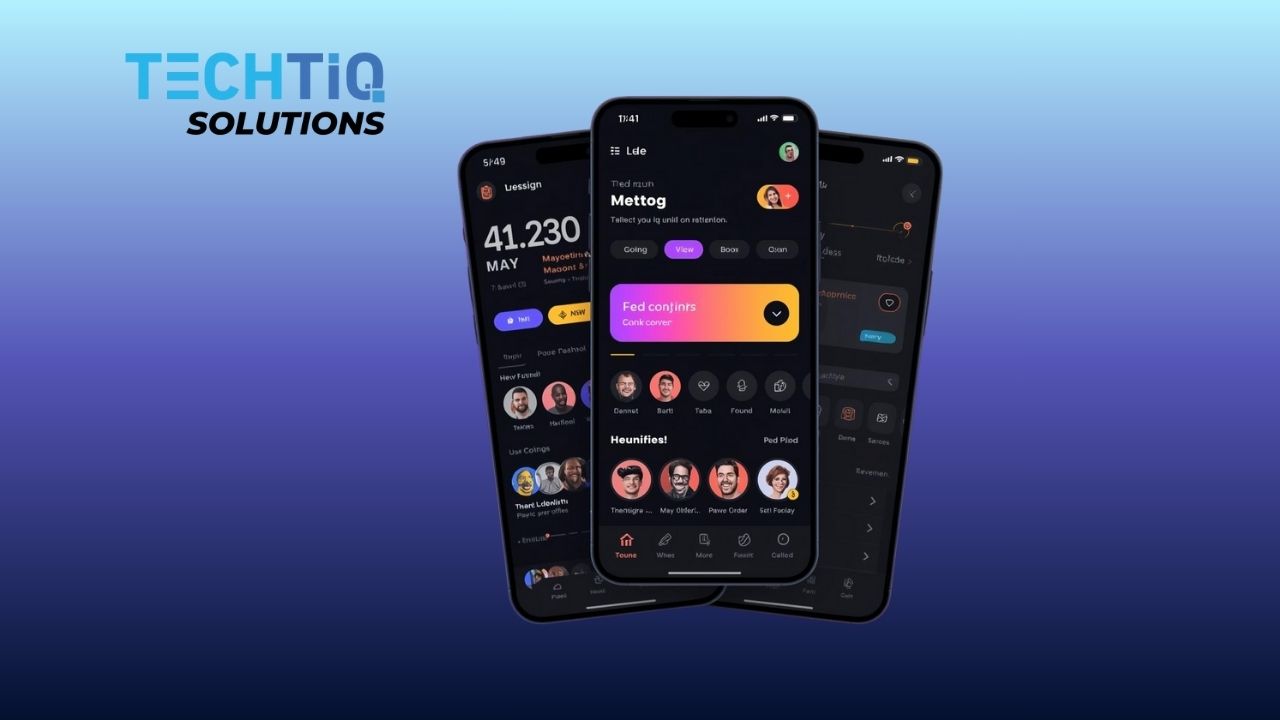What is mobile app development, and why has it become such a critical part of modern digital business? Mobile applications now shape how people communicate, shop, work, and access services every day. Statista stated that consumers spent 36.2 billion U.S. dollars on mobile apps during the second quarter of 2024, an increase of 12% since 2023. This expansion demonstrates the importance of mobile app solutions for businesses in every sector.
In this guide, you’ll learn the mobile application development meaning, how the process works step by step, the different types of mobile applications, common challenges, and emerging industry trends. So let’s check!
What Is Mobile Application Development?
Mobile application development is the process of creating software applications that run on mobile devices such as smartphones and tablets. In general, you build Android or iOS apps. The process also involves testing and maintaining.
How Can We Create a Mobile App with 7 Steps?
How to build a mobile app? The mobile application development lifecycle includes 7 stages. All of them will influence the final product, but each in its own way.
Step 1 – Identify the Goals & Requirements
The first step of mobile app development is all about your business goals and app requirements. Do you want the app to improve customer experience or increase sales? Some apps even optimize internal workflows. Plus, you need to understand your audience’s insights. Then, outline the app’s desired features. Effective planning helps ensure the final product meets your needs.
Step 2 – Design & Prototyping
This app design process turns your ideas into wireframes or prototypes. Looking at these early product versions, you can picture your app’s structure and flow. Also, you can prototype the app to ensure that its visual and functional sides correspond with your brand’s voice as well. If things get done right, your good UI/UX design will offer a seamless user experience.
Step 3 – Backend Architecture Planning
The backend architecture is the backbone of your app. It’s responsible for database design and user management. You cover third-party integrations in this stage, too. Your mobile app backend ensures scalability and security. This way, your app can handle increasing data loads and support your long-term business goals.
Step 4 – App Development Phase
Now, developers bring the design to life. They code the front-end and integrate it with backend services through API connections. Then, the design becomes a working product that can solve a problem. This task requires a technology stack. If you write Android applications, perhaps you will find yourself working in Java or Kotlin. Swift, Objective-C and other technologies are good tools for iOS app development. React Native, Flutter, and Xamarin have provided awesome work for cross-platform app development. Besides, many teams work in Agile and iteratively in order to always remain in contact and go faster.
Because this phase requires deep technical expertise across multiple platforms and frameworks, many businesses choose to work with professional mobile app development services in Singapore to ensure product quality and scalability.
Step 5 – Comprehensive Testing
App testing aims to verify that your app is ready for launch. This mobile testing phase involves many quality assurance methods. For example, you can test the functionality and security of your app. Check its usability, as well, to see if users can navigate it easily. Overall performance testing is important, too, to ensure it works as planned. Another key thing is continuous testing. This way, you can detect issues early. The goal is to save time and cost later. Plus, with a smooth app, you can improve user satisfaction.
Step 6 – App Store Submission & Launch Strategy
Now, once your app is complete, it’s time to send it to the app store. The target platforms are the Apple App Store or the Google Play. But app store submission is not just about uploading the app. You need to focus on app store optimization. This task involves working on the descriptions, visuals, and metadata. So do not forget to sketch a mobile app marketing plan for the successful launch of your app.
Step 7 – Maintenance & Continuous Improvement
Your app is live now. Yet, the mobile app development process doesn’t end. After launch, you should pay attention to ongoing updates and app maintenance. Then, you can find and fix bugs quickly. Your app can also be compatible with the new OS versions. User feedback and analytics play a key role here. Tune your app’s functionalities based on what they suggest. The application becomes a reliable and good-value product that stands the test of time.
How to Choose the Right Platform for Your Mobile App?
Choosing the right mobile app platform has a direct impact on user reach, performance, development time, and long-term scalability. Businesses typically evaluate factors such as target audience, budget, technical requirements, and desired features when deciding between native and cross-platform development approaches. You have three options as follows:
Android App Development Considerations
- Benefits: Android app development offers access to about 75% of global smartphone users. Thus, you can enjoy a broad user base. Developers also love the Android operating system for its flexibility. You will meet fewer restrictions when publishing your app to the Google Play Store.
- When to choose: Go for Android development when you target a wide audience or markets where Android dominates, especially when working with Android app development services to ensure scalability and performance.
iOS App Development Considerations
- Benefits: iOS app development gives you a stable and predictable iOS platform. It means you have fewer device variations. Hence, mobile app development teams often find it easier to optimize and maintain the app. Moreover, apps on the Apple App Store often have higher user retention and consistent performance.
- When to choose: Consider this approach if you’re targeting premium users or regions with high iPhone adoption by partnering with iOS app development services.
Cross-Platform App Development Considerations
- Benefits: Cross-platform apps can run on both Android and iOS. Hence, you ensure broad device compatibility. With cross-platform frameworks such as React Native, Flutter, and Xamarin, you only have to build a single codebase. You will save time and costs, then.
- When to choose: Choosing this approach enables you to access multiple platforms and speed up time-to-market.
What Are the Different Types of Mobile Apps?
There are several types of mobile apps. Each gives you distinct benefits and drawbacks. Check out to choose your ideal one!
Native Apps
Native apps work specifically for Android or iOS. Thus, you need platform-specific languages like Swift, Kotlin, or Java.
- Pros: Native mobile applications deliver high performance. Users can enjoy full device features and optimized UX.
- Cons: You have to create separate codebases for each platform. The process leads to higher development time and costs. You also need more resources.
Cross-Platform Apps
Cross-platform apps work across different platforms. The best thing is that you just need to create a codebase.
- Pros: So, you just need a single codebase to get your app up and running on multiple platforms. This simplicity helps you reduce development cost and time. The app is also easier to maintain.
- Cons: Cross-platform apps may not perform as powerfully as the native ones. Hence, they are not ideal in complex scenarios.
Hybrid Apps
Hybrid apps mean they combine web and native elements. And like cross-platform apps, these apps just use a single codebase to work across multiple platforms. Thus, these solutions are technically less complex than the fully native ones.
- Pros: Hybrid mobile applications enable faster development and easier deployment. You can build them using simple web development experience or no-code tools. Therefore, it’s perfect for business solutions in terms of cost.
- Cons: While efficient, hybrid apps have lower performance. Plus, you don’t have full access to some device features.
Progressive Web Apps (PWAs)
Progressive web apps are web-based solutions. They work just like mobile apps but are accessed directly through a browser by the user. Thus, you do not have to install the apps.
- Pros: Progressive web applications offer lower development costs and instant updates. Offline access and easy distribution make it efficient in reaching a wide audience.
- Cons: These apps have limited access to some device features. In addition, they do not perform as smoothly as native apps.
Hybrid vs Native Apps: Which One to Choose?
Plan to develop apps for both Android and iOS? Then consider what is better for your business between native and hybrid approaches. Your choice will affect the whole process ahead, including the development complexity, cost, performance, access to device features, and scalability. So, check this comparison table before moving forward!
| Hybrid Apps | Native Apps | |
| Pros |
|
|
| Cons |
|
|
Native applications typically run more efficiently, although they require more time to build, cost more, and demand a larger team. Hybrid applications are cheaper and faster to build. The drawback is that they can perform more slowly, and do not use all your desired features.
How Much Does It Cost to Build an App?
According to Business of Apps, mobile apps cost somewhere from $5,000 to $300,000. Mobile app development costs can range widely depending on the project’s scope, features, technology stack, and design requirements.
Key factors that influence app development costs include:
- App complexity and functionality
- Platform choice (Android, iOS, or cross-platform)
- App design quality
- Advanced technologies such as AI, IoT, or AR/VR
Rather than focusing only on upfront development costs, businesses should also plan for long-term maintenance, updates, and scalability to maximize the return on investment.
For a detailed breakdown of real-world pricing and budget considerations, explore our complete guide on mobile app development cost in Singapore.
Challenges in Mobile App Development
The benefits are so clear, but remember that your journey won’t be that easy. Here are some mobile app development challenges to watch out for!
Security and Data Privacy Concerns
App security must be the first thing that pops into developers’ minds when they work on an app development project. Every app may encounter malware, cyberattacks, or data leaks sometimes. You must plan ahead to keep your app secure. Data encryption and authentication should be in your checklist. Plus, follow industry standards like GDPR and HIPAA. It’s a must!
Cross-Platform Compatibility
You can divide your customers into two groups: iOS and Android users. Thus, your app should work seamlessly across devices so you can engage both groups. That’s why many companies now use cross-platform apps. But be aware that this move may mean performance issues and the lack of desired features, as we have mentioned above.
User Retention and Engagement
Plan to make apps for mobile phones? Many businesses share the same idea. Thus, competition is fierce. To stand out in this crowded space, invest in marketing. Make your app easy to find and use, too. With an impressive user experience, you can win your audience’s hearts.
Budget and Timeline Management
Many projects meet time and budget restrictions. The features you want to include in the app may make you run out of money before it can reach users. You can address this by providing a detailed plan, with realistic budgets and time frames, and sticking to it. Be sure to monitor your funding regularly to keep everything in check.
The Future of Mobile App Development in 2026
Mobile app development continues to evolve rapidly, driven by emerging technologies and changing user expectations. To stay competitive, businesses must keep up with the trends shaping the future of mobile applications.
- Emerging mobile technologies: Artificial intelligence and machine learning are transforming personalization, automation, and data-driven experiences. AR and VR are also gaining momentum as users seek more immersive interactions, while IoT and blockchain continue to expand mobile capabilities.
- Low-code and no-code development: These platforms are simplifying app creation, enabling faster prototyping and reducing development barriers for businesses of all sizes.
- Sustainability: Energy-efficient app design and optimized performance are becoming increasingly important as users and regulators focus on environmental impact.
- Data privacy: Strong encryption, compliance frameworks, and privacy-first design will remain essential as mobile ecosystems grow.
Wrapping Up
Now you have a clear understanding of what mobile app development is and how the complete process works — from planning and design to development, testing, and ongoing improvements. Each stage plays a critical role in creating scalable, high-quality mobile applications.
If you’re exploring how to turn an app idea into a real-world product, working with a trusted mobile app development company in Singapore can help streamline the process and avoid common challenges. You can also learn more about our work at TechTIQ Solutions or contact us today to discuss your project goals.
FAQs
How long does it take to make a mobile app in Singapore?
A simple app just requires a few weeks to form. Yet, you need several months for complex ones. Take the app’s complexity and your business goals into consideration to receive the precise timeline of the mobile application development process.
How much does it cost to develop a mobile app in Singapore?
You may spend between $25,000 to $300,000 on an app development project. This is such a huge range of prices, but it depends on how complicated the app is and what platforms it will be available for.
Which software is best for mobile app development?
Developers often use tools such as Xcode for iOS, Android Studio for Android, and cross-platform frameworks like Flutter, React Native, and Xamarin to build modern mobile applications.
Which type of mobile app to build?
The best app type depends on your goals and budget. Native apps offer high performance, cross-platform apps reduce development time and cost, hybrid apps enable faster builds, and progressive web apps provide lightweight browser-based experiences.
Is mobile app developer easy?
While learning mobile and web app development can seem daunting at first, it’s truly like any other skill. The key is consistency. If you practice and commit the time, it gets easier. Having expert guidance also helps smooth out the learning curve considerably!
What type of skill is needed of a mobile app developer?
A mobile developer needs strong expertise in modern programming languages to build smart, usable apps. The main skills are familiarity with platform APIs (like iOS and Android) and the ability to use cross-platform tools to efficiently deploy apps across different devices.
What is an example of mobile application development?
Popular mobile apps include social platforms like Instagram, streaming services like Spotify, e-commerce apps, productivity tools, and financial applications built for Android, iOS, or cross-platform environments.
Can I build an app with no coding?
Yes. No-code and low-code platforms allow users to create basic mobile applications using visual drag-and-drop tools. However, custom development is recommended for complex, scalable, and high-performance apps.









